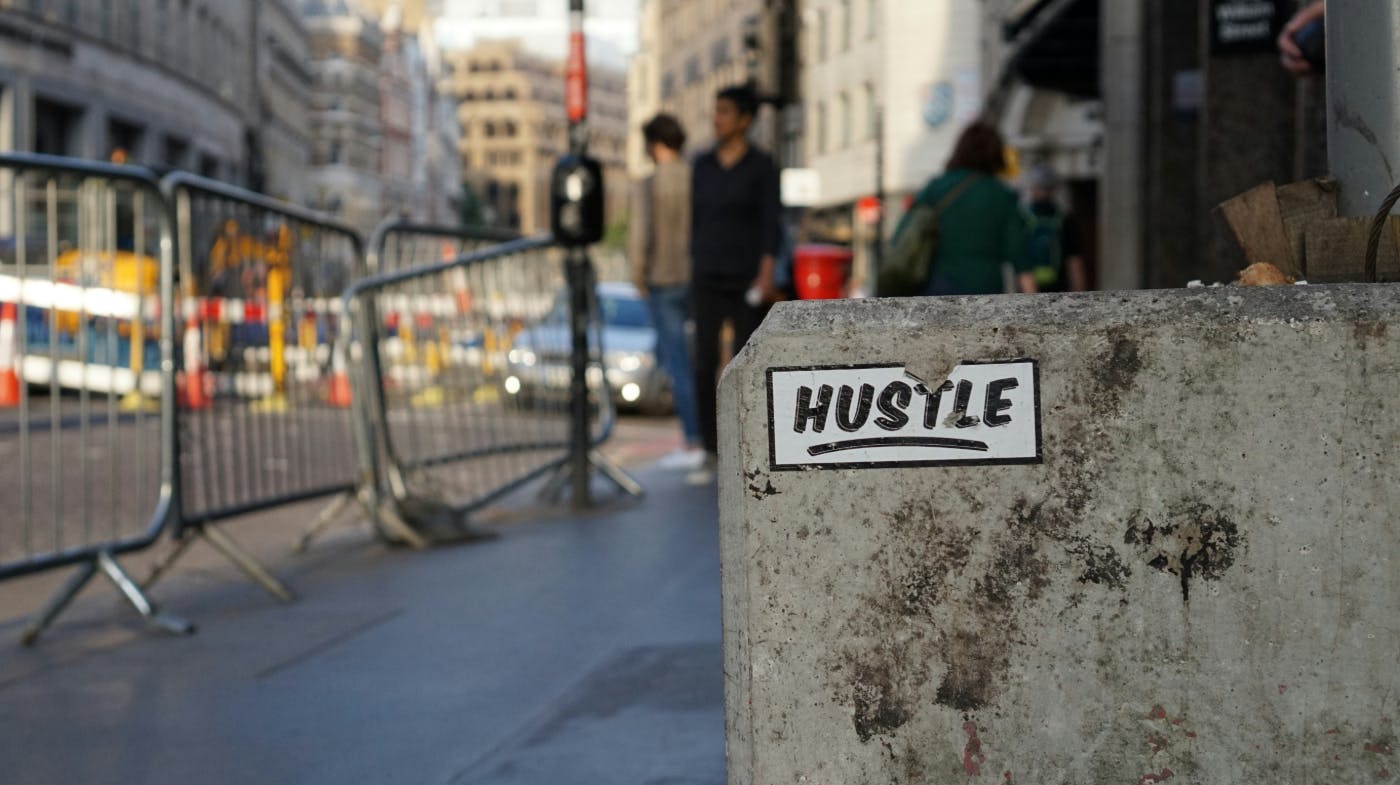
Ah, hustle culture—the modern badge of honor that says, "I don’t sleep, I grind!" It’s the glorification of overwork, the obsession with productivity, and the strange belief that if you’re not running three side hustles while sipping your fourth coffee, you’re basically a disappointment to capitalism.
Welcome to the Grind (or Should I Say, The Treadmill?)
Ah, hustle culture—the modern badge of honor that says, "I don’t sleep, I grind!" It’s the glorification of overwork, the obsession with productivity, and the strange belief that if you’re not running three side hustles while sipping your fourth coffee, you’re basically a disappointment to capitalism.
But let’s be honest: hustle culture is kind of like eating a ghost pepper. It sounds daring, even exhilarating at first, but before long, you're sweating, crying, and questioning every decision that led you to this point. The only difference? At least with the ghost pepper, the suffering eventually stops.
Hustle culture tells you that every moment of your day must be optimized. Your lunch break? An opportunity to listen to a finance podcast. Your evening walk? Prime time for brainstorming your next "big idea." That 20-minute window between meetings? Perfect for launching a side hustle selling artisanal dog bowties. And sleep? Oh, you sleep? Must be nice to lack ambition.
And let’s not even start on social media. If you’re not waking up at 4 AM, meditating, drinking a smoothie that tastes like lawn clippings, and writing in your gratitude journal before closing six business deals by breakfast—are you even trying? (Meanwhile, some of us are just happy to have found both our socks before noon.)
So, let’s break down the beast that is hustle culture—where it came from, why it’s so addictive, and whether we should all just take a collective nap instead.

The Rise of Hustle Culture: Where Did This Madness Begin?
There was a time when working a solid 9-to-5 was considered respectable. You clocked in, did your job, went home, and had dinner with your family. Simple. Then came the Industrial Revolution, which introduced long factory hours. Then came corporate America, which introduced the joy of fluorescent-lit cubicles. And then, the internet arrived and said, "Hey, why work one job when you can be available all the time?"
And let’s talk about Silicon Valley. Those early tech startups weren’t just about innovation; they were about the grind. Work-life balance? That was for people who weren’t trying to change the world. The myth of the genius founder pulling all-nighters in a garage became the gold standard of success. If you weren’t sacrificing your social life, your sleep, and possibly your sanity for the dream, were you even dreaming big enough?
But the real gasoline on the fire? Social media. Suddenly, we weren’t just working—we were branding ourselves. LinkedIn became a battlefield of productivity flexes, Twitter turned into an entrepreneurial boot camp, and Instagram made it look like everyone else was living their best #BossLife while you were still trying to get your Wi-Fi to work.
And let’s not forget the influencers. You know the ones. They wake up at 4 AM, meditate for an hour, drink a green smoothie made from vegetables you’ve never heard of, and then casually mention they closed six deals before breakfast. (Meanwhile, you're trying to aerosolize coffee so you don't have to sit up to lift a cup.)
But many of these influencers? They have teams. They have assistants, editors, and entire production crews making their "hustle" look effortless. You're single-handedly juggling a job, side gig, meal prep, and an ever-growing pile of laundry. No wonder burnout is the new normal.
The Hustle High: Why We Fall for It
Here’s the thing—hustle culture isn’t all bad. There’s something exhilarating about setting big goals, chasing dreams, and feeling that rush of accomplishment. The problem? It’s a slippery slope from "motivated go-getter" to "chronically exhausted caffeine addict."
Hustle culture feeds off a few key things:
- The dopamine hit of achievement: Checking off a task feels good. Checking off 47 tasks feels amazing. Have you ever added something to your to-do list just so you could immediately cross it off? Yeah, same.
- The illusion of control: If you work hard enough, you’ll make it. (Spoiler alert: Sometimes, luck plays a role, too. No one wants to admit that.)
- The fear of falling behind: Everyone else is hustling, so if you’re not, you must be failing. Right? (Wrong.)
And let’s talk about the cult of productivity apps. You know, those digital to-do lists that promise to revolutionize your workflow, when in reality, you spend 30 minutes color-coding your tasks instead of actually doing them? But it feels productive, so we keep at it.
Or the glorification of busy. Ever had a conversation that goes something like this?
"Hey, how’s it going?"
"Oh, you know, just so busy. Absolutely slammed. No time to breathe."
It’s never, "Oh, I’ve been taking it easy, enjoying life." Because in hustle culture, admitting to leisure time is basically saying, "I’ve given up on success." And we can’t have that.

The Dark Side of the Grind: When Hustle Culture Gets Toxic
At some point, the grind stops being inspiring and starts feeling like a never-ending game of whack-a-mole. You tackle one task, and five more pop up. Before you know it, you’re answering emails at 2 AM, mistaking your reflection for a coworker, and developing a deep, personal relationship with your coffee machine.
Signs you might be caught in the hustle trap:
- You measure your worth by how "productive" you are.
- You feel guilty for taking a break (because time is money!).
- Your sleep schedule is more chaotic than a toddler on a sugar high.
- You don’t remember the last time you had a real day off.
- Your hobbies are now monetized because why just paint when you could sell your art on Etsy?
Burnout isn’t a badge of honor, but hustle culture makes it seem like it is. And that guilt? It’s sneaky. Even when you’re exhausted, there’s that little voice whispering, "Shouldn’t you be doing something productive?"
Breaking Up with Hustle Culture (Without Feeling Like a Quitter)
So, how do you break up with hustle culture without feeling like you’ve given up on success? Simple: you treat it like a toxic ex. You block its number, stop responding to its 2 AM "you up?" messages (aka emails from your boss), and remind yourself daily that you deserve better.
Of course, it’s not always that easy. Hustle culture has a sneaky way of making you feel like rest is laziness and that if you’re not running at full speed 24/7, you’ll fall behind. So, let’s talk about how to step away from the grind without losing ambition.
Practical Steps to Escape the Hustle Trap:
- Redefine Success – Success isn’t just about how many hours you put in. It’s about what you’re working toward. Are you actually making progress or just keeping yourself busy?
- Set Hard Boundaries – Turn off notifications outside work hours. Stop answering emails in bed. If a task can wait until tomorrow, let it wait. Your brain needs downtime to function properly.
- Schedule Rest Like It’s a Meeting – If you live by your calendar, put "doing nothing" on it. If it’s scheduled, it’s official, and no, you don’t need to justify it to anyone.
- Detach Your Self-Worth from Productivity – You are not your to-do list. Being exhausted does not make you more valuable. Your existence is not a series of checkboxes to be completed.
- Reclaim Your Hobbies – Not every passion needs to be monetized. Bake a cake just to eat it. Draw something without turning it into a print shop. Dance in your kitchen without filming it for content.

The Emotional Side of Letting Go
The hardest part of quitting hustle culture is dealing with the internal guilt. That nagging voice that says, "But what if I’m not enough without all the work?" That’s the biggest lie hustle culture ever told you.
Rest isn’t the enemy of success—it’s necessary for success. No one does their best work when they’re sleep-deprived, jittery, and on their fourth energy drink. No one gets their best ideas when they’re too busy checking their email to think clearly.
So, take a deep breath. Let yourself slow down. Unsubscribe from at least one productivity newsletter. You’re not quitting the game—you’re just finally playing it on your own terms.
Summing Up: Hustle, But Make It Healthy
Let’s hit the key takeaways one last time:
- Hustle culture sells the dream of success but often delivers exhaustion.
- Busyness isn’t the same as productivity. If you’re always working but never moving forward, something’s off.
- You don’t need to monetize everything you love. Some things can just be hobbies.
- Rest is fuel, not failure.
- You are not behind. You are not lazy. You are allowed to breathe.
And for the grand finale, here’s your official Anti-Hustle Manifesto:
I, [Insert Your Name Here], do solemnly swear to stop glorifying burnout, to set actual work-life boundaries, and to resist the urge to check my email at unholy hours. I will no longer mistake caffeine jitters for ambition, nor will I turn my hobbies into side hustles just because a podcast told me to. I will take naps without guilt, eat cake without a business plan, and occasionally ignore my phone without fear that the world will crumble. Success should not require self-destruction, and I refuse to be another sacrifice at the altar of The Grind.
Now, if you’ll excuse me, I have a nap to take.

